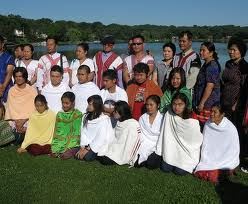Most of you who are regular attenders at evangelical churches probably have a Sunday morning routine that is similar to many others. You go to Sunday school, you drink coffee, and you catch up on the week with fellow congregants. You go to worship and sing praise choruses or hymns. You scan the bulletin for other activities you may be involved in: small groups, outreach projects, the choir practice. You listen to a decent sermon and hope the pastor is done by noon so you can beat the Presbyterians to the Olive Garden.
It is a pattern that carries its own joys and frustrations. Over the years, a few people leave and enter the picture. The worship and church projects may change somewhat. But you see God at work and there may be a certain comfort in the familiarity of the overall pattern.
So let us suppose that one Sunday morning, 75-100 Asians walk into your church, unannounced. Most of them cannot speak English. They are of all ages and they do not look to have much income. Their leader tells you that they are from Myanmar. They are refugees who have just been moved to the United States. And they want to start attending your church (attendance of about 150-200) because your church is Baptist and they, too, are Baptists.
What do you do? Well, you know, you’d have to try to accommodate them, wouldn’t you? I mean, it’s a church and you have all those Bible admonitions to deal with. You can’t really ignore 75 new people standing around in your foyer, can you?
But how would you accommodate them? Just let them sit in church? Do you stick their children into your Sunday Schools? And what happens in the weeks ahead? Do you teach them all English? Do they need assistance with clothes, transportation, or finding jobs? How much do they need to know about Christianity? Will you have to set up separate classes for the adults? Separate worship? The deeper you go, the more questions that arise.
I love this story.
I love this story for a couple of reasons. First, it is not hypothetical. It happened a few years ago to a Baptist church in upstate New York. (I got the story second-hand, so some of the details may not be exactly accurate, but I believe the fundamental points are sound).
I also love this story because it shows an unanticipated way that God is at work. Sometimes, He pushes people out of their comfort zone. I’m OK with that. Especially if I’m not the one who is made uncomfortable.
I also love this story because it repeats the George Boardman story in a different form. These refugees were from the Karen people of Myanmar, which is sometimes also known as Burma. Their ancestors became Christians about 170 years ago after a small delegation of Karen arrived on Boardman’s doorstep.
This New York church, collectively, faced similar sort of challenges that George Boardman did. They suddenly had a ministry on their hands that they did not seek or anticipate. They weren’t asked to go out and preach in a jungle, but they were asked to adjust their patterns of ministry. Sunday mornings would not be the same. Their plans for the future had to change. Those adjustments aren’t usually easy to make.
Most evangelical Christians have not been hit with anything quite like this in their church. And you may feel pretty comfortable in thinking that it is pretty rare.
Don’t be so sure.
Broadly speaking, this story results from a powerful trend that has swept the world in the last several decades. This trend is the remarkable growth of world Christianity, which is the embodiment of Christianity among diverse culture groups around the world.
World Christianity is not only growing. It is coming to the United States. Thousands of churches have already found themselves reacting to the arrival of Christian immigrants who have, in some way, forged connections to their ministries. Your church might be confronted with something very similar someday. How will evangelical churches respond? It is, I think, an important question.

